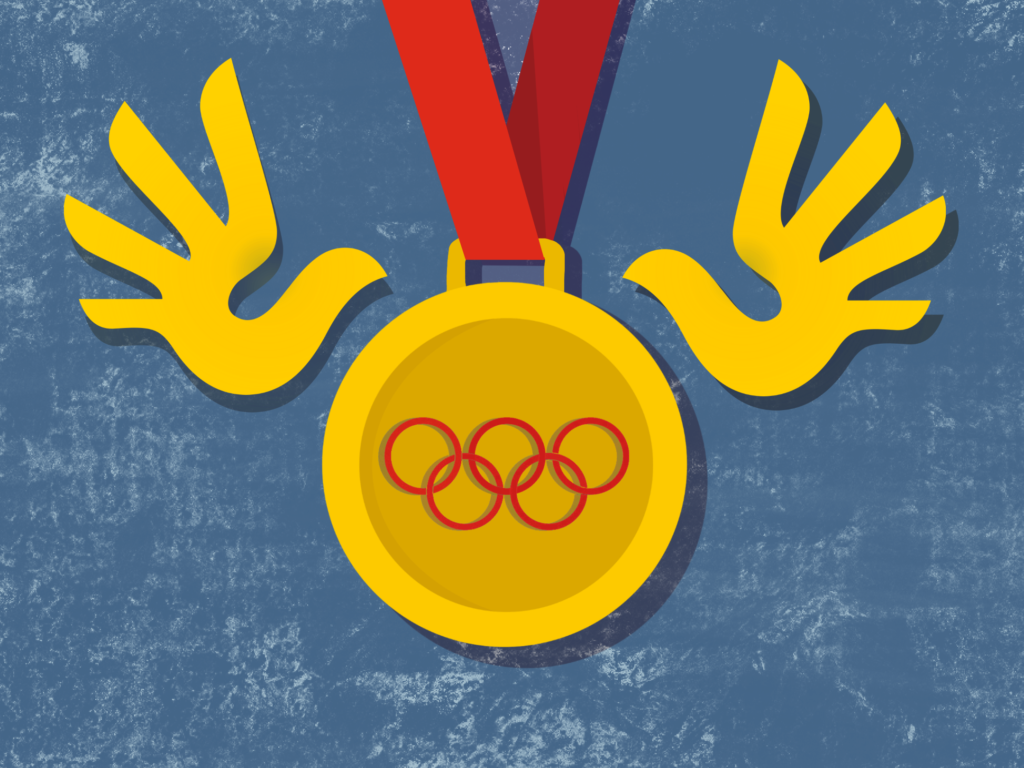
Graphic by Yujin Kim/The Choate News
The 2022 Winter Olympic Games will take place in Beijing, with an opening ceremony scheduled for February 4, 2022. While the focus of the opening ceremony is to introduce the elite competing athletes with grandiosity, the gathering of high-ranking politicians is an essential part of upholding the global aspect of the Olympic Games. Yet, government officials from countries such as the United States, the United Kingdom, Canada, and Australia will not be attending the games in Beijing because of a diplomatic boycott in regards to China’s violation of human rights.
Diplomatic boycotts effectively demonstrate geopolitical disputes without undermining the importance of the Olympic games and, therefore, should become more normalized. The awareness spread by these boycotts may also be further established through the participation of athletes, but an athlete’s consent is necessary for the continuation of the Olympic Games.
Boycotting the Olympic Games is nothing new. One of the first instances of boycotting in the Olympics was in 332 BCE, in Ancient Greece, when Athens threatened to withdraw from the event after an Athenian athlete was accused of bribing his opponents.
More recently, in 1980, during the Cold War, the United States, China, and 44 other nations boycotted the Moscow Olympic Games, to protest the Soviet invasion of Afghanistan. This boycott prevented both diplomats and athletes from participating in the event. In response, the Soviet Union and its allies withdrew their athletes from the Los Angeles Olympic Games, in 1984. Experts note that while the boycotts were able to spread awareness about the Soviet Union’s invasion of Afghanistan, the boycotts were unsuccessful in changing Soviet policy and that its primary victims were the athletes who were prohibited from participating. The valuable lesson learned was the importance of separating sports and politics.
In fact, the International Olympic Committee (IOC) has worked for more than 40 years to ensure “political neutrality” between competing nations by “preserving the autonomy of sport.” However, the IOC’s political neutrality has become a topic of controversy, as professional Chinese tennis player Peng Shuai disappeared following her sexual assault allegations against a former official of the Chinese Communist Party. Organizations such as the Humans Rights Watch have accused the IOC of covering for China, which has censored any information about Shuai.
The United States’ solution was a diplomatic boycott of China this winter. The allegations that the U.S. have leveled against the host nation move beyond Shuai’s disappearance to include a violation of human rights against Uyghurs, ethnic minorities in Xinjiang, and the suppression of democracy protests in Hong Kong in 2020. While diplomatic boycotting may not be the catalyst to end violations of human rights in China, the spread of information through a globally recognized medium such as the Olympics can contribute greatly to the fight against human-rights violations.
On the other hand, allowing athletes to disapprove of the political ideals and policies of a country during the Olympics demonstrates the violation of political neutrality among the athletes. Despite the atrocities committed by countries participating in the Olympics, the home nation of athletes should not be criticized and ridiculed by athletes in an attempt to spread awareness. Instead, the IOC must look into banning countries from participating in the Olympics depending on their violation of widely-accepted global laws or treaties. For instance, the IOC banned Germany and Japan from the 1948 London Games for their roles in World War II, while South Africa was banned from the Olympics from 1970 until 1992 for its Apartheid regime. Similarly, it may be necessary for the IOC to look into banning China in an attempt to persuade the nation to cease its human-rights violations, but this should be a last resort in an attempt to spread awareness and prevent the detrimental effect that politics may have on the functionality of the Olympics.




